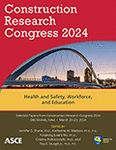Challenges in Supplier Diversity and Inclusions Programs in the US Construction Industry
Publication: Construction Research Congress 2024
ABSTRACT
Almost four decades ago, federal and local governments began incorporating Small and Disadvantaged Business Enterprise (DBE) programs into their construction projects. However, the private sector in the US construction industry does not have similar requirements, and the benefits and challenges of these programs are not well understood. This exploratory study aims to identify the challenges of supplier diversity and inclusion programs in the US construction industry. Based on current literature and Twitter analysis, the study found that most DBE construction-related companies lack financial power, resources, and experience. Some may find it difficult to enter already-established relationships between prime contractors and existing DBEs. In addition, contract requirements and project delivery types can be restrictive for them, and the scope of work can be either felt extensive or limited based on their resources. This study also provides future research directions for successfully implementing supplier diversity and inclusion programs in the US.
Get full access to this article
View all available purchase options and get full access to this chapter.
REFERENCES
AGC (Associated General Contractors). (2023, April 15). Disadvantaged Business Enterprise (DBE) contractors’ tool kit. https://www.agc.org/sites/default/files/DBE_Tool_Kit_Final_10-19-06.pdf.
Bateman, A., Barrington, A., and Date, K. (2023, April 15). Harvard Business Review, Why You Need a Supplier-Diversity Program. https://hbr.org/2020/08/why-you-need-a-supplier-diversity-program.
ClaycoRising. (2023, July 25). Clayco Inc diversity and inclusion program. https://claycorising.com/.
CFR (Code of Federal Regulations). (2023, April 15). Title 49 Part 26 Participation by Disadvantaged Business Enterprises in Department of Transportation Financial Assistance Programs. https://www.ecfr.gov/current/title-49/subtitle-A/part-26?toc=1.
Chiu, Y. C. (2014). Balancing exploration and exploitation in supply chain portfolios. IEEE Transactions on Engineering Management, 61(1), 18–27.
Choi, J. O., Shane, J. S., and Chih, Y.-Y.“Diversity and inclusion in the engineering-construction industry” (2022): 02021002. https://ascelibrary.org/doi/abs/10.1061/%28ASCE%29ME.1943-5479.0001005.
Culture of Care. (2023, April 15). Impact Champions. https://buildculture.org/impact-champions/.
Dang, H. (2023). Exploratory Investigation on Diversity and Inclusion Programs in Large Construction Companies from the Private Sector in the United States of America. In Proceedings of the Canadian Society of Civil Engineering Annual Conference 2021: CSCE21 General Track Volume 2 (pp. 429–439). Singapore: Springer Nature Singapore.
DeFazio, P. A. (2021, November). Text-HR 3684-117th Congress (2021-2022): Infrastructure Investment and Jobs Act. In /bill/117th-congress/house-bill/3684/text.
FHWA (Federal Highway Administration). (2023, April 15). Disadvantaged Business Enterprise Supportive Services (DBE/SS) Program. https://www.fhwa.dot.gov/civilrights/programs/dbess/.
Liu, B. (2020). Sentiment analysis: Mining opinions, sentiments, and emotions. Cambridge university press.
Mohammad, S. M., and Turney, P. D. (2013). NRC Emotion Lexicon. National Research Council, Canada, 2, 234.
NAWIC (National Association of Women in Construction). (2023, July 25). Diversity, Equity, and Inclusion https://www.nawic.org/content.asp?contentid=292.
NCHRP (National Cooperative Highway Research Program) Web-only Document 120. (2005). Survey of State Practices for Protecting Transportation Agencies Against Construction and Disadvantaged Business Enterprise Fraud Including Use of Contractor Suspension and Debarment Procedures. Washington DC. Transportation Research Board.
NCHRP (National Cooperative Highway Research Program) Synthesis 343. (2005). Management of Disadvantaged Business Enterprise Issues in Construction Contracting. Washington DC. Transportation Research Board.
NCHRP (National Cooperative Highway Research Program) Synthesis 416. (2011). Implementing Race-Neutral Measures in State Disadvantaged Business Enterprise Programs. Washington DC. Transportation Research Board.
NCHRP (National Cooperative Highway Research Program) Synthesis 448. (2013). State Department of Transportation Small Business Programs. Washington DC. Transportation Research Board.
NCHRP (National Cooperative Highway Research Program) Synthesis 481. (2015). Current Practices to Set and Monitor DBE Goals on Design-Build Projects and Other Alternative Project Delivery Methods. Washington DC. Transportation Research Board.
NCHRP (National Cooperative Highway Research Program) Research Report 913. (2019). Compendium of Successful Practices, Strategies, and Resources in the U.S. DOT Disadvantaged Business Enterprise Program. Washington DC. Transportation Research Board.
NMSDC (National Minority Supplier Development Council). (2023a, April 15). About NMSDC. https://nmsdc.org/.
NMSDC (National Minority Supplier Development Council). (2023b, April 15). Economic Impact Facts-and-Figures Report. https://nmsdc.org/about-nmsdc/annual-reports/nmsdc-economic-impact-facts-and-figures-08-23-20-1/.
Nieto, M. J., and Santamaría, L. (2007). The importance of diverse collaborative networks for the novelty of product innovation. Technovation, 27(6-7), 367–377.
Supplier.io. (2023, April 15). 2023 Supplier Diversity Benchmarking Report. https://supplier.io/resources/reports/2023-supplier-diversity-benchmarking-report.
Social App Report. (2023). Revenue, usage and demographics on the major social apps. https://www.businessofapps.com/data/social-app-report/?utm_source=social&utm_medium=click&utm_campaign=Hyperlink+report.
Sordi, A., Tate, W. L., and Huang, F. (2022). Going beyond supplier diversity to economic inclusion: where are we now and where do we go from here?. Journal of Purchasing and Supply Management, 28(2), 100751.
Terada, K., Yamauchi, A., and Ito, A. (2012). Artificial emotion expression for a robot by dynamic color change. In 2012 IEEE RO-MAN: The 21st IEEE International Symposium on Robot and Human Interactive Communication (pp. 314–321). IEEE.
Thomaz, I. F., & Catalão-Lopes, M. (2019). Improving the mentoring process for social entrepreneurship in Portugal: A qualitative study. Journal of Social Entrepreneurship, 10(3), 367–379.
DOT. (2023, April 15). DBE Laws, Policy, and Guidance. https://www.transportation.gov/civil-rights/disadvantaged-business-enterprise/dbe-laws-policy-and-guidance.
USEEOC (US Equal Employment Opportunity Commission). (2023 May). Building for the Future: Advancing Equal Employment Opportunity In the Construction Industry. https://www.eeoc.gov/building-future-advancing-equal-employment-opportunity-construction-industry.
GSA (US General Services Administration). (2023, July 25). Results of New Survey Recommends Steps to Improve Diversity, Equity and Inclusion in Design and Construction Industry. https://www.gsa.gov/about-us/newsroom/news-releases/results-of-new-survey-recommends-steps-to-improve-diversity-equity-and-inclusion-in-design-and-construction-industry-11092022.
Information & Authors
Information
Published In
History
Published online: Mar 18, 2024
ASCE Technical Topics:
Authors
Metrics & Citations
Metrics
Citations
Download citation
If you have the appropriate software installed, you can download article citation data to the citation manager of your choice. Simply select your manager software from the list below and click Download.
